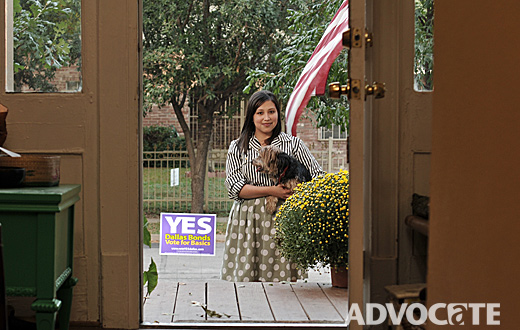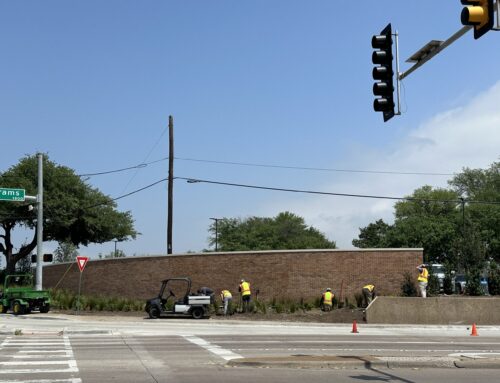
Monica Huerta can’t sleep when it rains for fear her home and car will flood. She’s working to inform her neighbors about the upcoming city bond election. Photo by Can Türkyilmaz
More than half the proposed $600 million bond package would go to drainage
Story by Rachel Stone | Photo by Can Türkyilmaz
For residents in the 300 block of Alcalde Street in Old East Dallas, rising waters are not that unusual. During an especially heavy rain, maybe once every three years or so, water floods into their homes. Once the storm is over, they haul their furniture outside to let it dry in the sun.
The flooding happens because this neighborhood, Queen City, is adjacent to Mill Creek, or what used to be Mill Creek before developers built over it. The city wants to fix this by creating an enormous underground drainage system that would prevent flooding in Queen City and other parts of Old East Dallas, the Baylor hospital area, Fair Park and Victory Park. The system comes with a $324 million price tag, which the city hopes to pay for with municipal bonds.
In the Nov. 6 election, Dallasites will vote on whether to approve $600 million in bonds, most of which would go to the flood-control system.
The city wants to build a 30-foot high conduit 100 feet underground that would funnel floodwaters five miles to the Trinity River. That will cost about $219 million. And the city also needs to make improvements to pump stations along the Trinity, which will cost another $92 million.
Pitching this bond election to voters is like considering a new hot water heater for your house, says former City Councilman Alan Walne.
“It’s not what you’d call a sexy project,” he says. “But all the same, it’s very needed.”
As more development occurs between Old East Dallas and Victory Park, the worse flooding woes become, he says. There is less dirt to absorb the runoff.
Monica Huerta moved to a house in Queen City about three and a half years ago. The first very heavy rain came early one morning a few months later. She left for work, worried about traffic and keeping dry. About an hour later, the water rose up over her porch, leaving her boyfriend stranded in the house. The flood totaled his car.
Huerta says she was amazed that her neighbors took it all in stride.
“They were like, ‘This is just what happens here. Get used to it,’ ” she says.
Huerta bought flood insurance that week, but rain keeps her up at night. If her street shows any signs of flooding, she immediately leaves.
So the bond election is personal for her, but she thinks it’s something that affects everyone.
“When you go to Fair Park or to the emergency room at Baylor, are you going to be washed way in the flood, or is your car going to be totaled?” she says. “You don’t want to have to worry about that.”
Walne says bonding agencies like to see cities paying for unglamorous infrastructure projects like these because it shows that we’re taking care of our bones.
“We’ve put this off long enough,” he says. “The libraries and rec centers and all the things we’d like to pay for will have to take a time out this time around because we’ve got to take care of the basics.”





